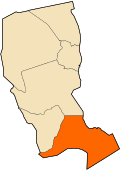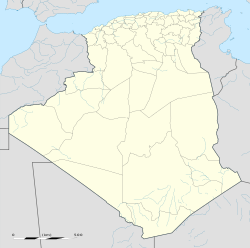Djanet
|
Djanet ﺟﺎﻧﺖ |
|
|---|---|
| Town and commune | |

A view of Djanet
|
|
 Location of Djanet Commune within Illizi Province |
|
| Location of Djanet within Algeria | |
| Coordinates: 24°33′18″N 9°29′7″E / 24.55500°N 9.48528°ECoordinates: 24°33′18″N 9°29′7″E / 24.55500°N 9.48528°E | |
| Country |
|
| Province | Illizi |
| District | Djanet (seat) |
| Government | |
| • PMA Seats | 7 |
| Area | |
| • Total | 57,460 km2 (22,190 sq mi) |
| Elevation | 1,035 m (3,396 ft) |
| Population (2008) | |
| • Total | 14,655 |
| • Density | 0.26/km2 (0.66/sq mi) |
| Time zone | CET (UTC+01) |
| Postal code | 33100 |
| ONS code | 3302 |
Djanet (Arabic: جانت) is an oasis city, and capital of Djanet District, in Illizi Province, southeast Algeria. It is located 412 km (256 mi) south of the provincial capital, Illizi. According to the 2008 census it has a population of 14,655, up from 9,699 in 1998, and an annual population growth rate of 4.3%. It is inhabited by the Kel Ajjer Tuareg people.
The region of Djanet has been inhabited since Neolithic times. There were periods of ten thousand years at a time that the area was not desert. The flora and fauna were luxuriant as is seen in the numerous rock paintings of Tassili n'Ajjer around Djanet. Populations of hunter-gatherers lived there.
Djanet was founded in the Middle Ages by the Tuareg. The Ottoman Empire, which had a nominal authority over the Fezzan region, reinforced their presence in the area at the beginning of the 20th century in reaction to the colonization of Africa by the Europeans.
Djanet, and the nearby towns of Azelouaz, El Mihan, Adjahil and Eferi, lie in a valley carved by the intermittent river (wadi) Oued Idjeriou through the southwest edge of the Tassili n'Ajjer mountain range. The Tadrart Rouge is located to the southeast and is a southern prolongation of the Libyan Tadrart Acacus.
Due to the somewhat cooler air, higher humidity and somewhat higher rainfall in these areas, the nearby mountains support a greater amount and variety of wildlife than lower-lying areas in the Sahara, and forms part of the West Saharan montane xeric woodlands ecosystem. Djanet itself lies at an altitude of 1,035 metres (3,396 ft), but the mountains to the east and north reach as high as 1,905 metres (6,250 ft).
...
Wikipedia

